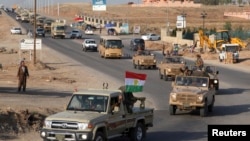Iraqi Kurdish peshmerga fighters are headed to Kobani to help Syrian Kurds who have been fighting Islamic State militants since September for control of the town just south of the Turkish border.
Saleh Moslem, co-chairman of the Kurdish Democratic Union Party (PYD), told Reuters that some peshmerga fighters were expected to arrive in Kobani late Tuesday.
Kurdish officials said 80 fighters, equipped with artillery and machine guns, would fly to Turkey Tuesday, cross the border and join the battle for Kobani. Another 72 are expected to arrive Wednesday.
On Tuesday afternoon, a large peshmerga convoy with heavy weapons was seen in Irbil, The Associated Press reported.
Turkish Foreign Minister Mevlut Cavusoglu said the peshmerga forces would enter embattled Kobani "at any moment."
Turkey has balked at sending its own troops into the Kobani conflict, because it said the Syrian Kurds fighting in Kobani are linked to the outlawed Kurdistan Workers' Party, which has waged a three-decade fight with Turkey for Kurdish cultural and political rights.
But last week, Ankara agreed to allow the peshmerga fighters to travel through Turkey to get to Kobani.
US airstrikes
The fighting continued Tuesday, with the U.S. launching four more airstrikes on Islamic State positions in Kobani, also known as Ayn al-Arab, and nine other strikes against the jihadists in Iraq.
Cameras positioned just across the border in Turkey captured what appeared to be massive blasts from airstrikes by the U.S.-led coalition that has been targeting the Islamic State group in Syria for more than a month.
Residents and refugees from Kobani told VOA the latest airstrike hit around midday and seemed to be focused on the central part of the city, which is currently being fought over by Kurdish militias and Islamic State fighters.
The airstrikes in Iraq are aimed at helping Baghdad's military reclaim territory from the Sunni extremists who swept through large areas of the northern and western part of the country in July and August.
U.S. and allied attack, fighter and remotely controlled aircraft on Tuesday targeted the Mosul dam area. Two strikes near Fallujah destroyed a small Islamic State unit and tank.
Other strikes were staged west of Baghdad, near Sinjar and northwest of Haditha, the U.S. Central Command said.
Turkish troops
Davutoglu said on Tuesday that his country cannot be expected to send troops to defend Kobani and only Iraqi Kurdish peshmerga fighters and Syria's own moderate opposition can save it.
No coalition allies have publicly called on Turkey to intervene militarily, but images of Turkish troops standing by as Islamic State fighters advanced just across the border have drawn criticism.
Turkish officials have rebuffed international criticism over their reluctance to do more to help Kobani's beleaguered Kurdish defenders.
U.S. warplanes have been bombing Islamic State positions near Kobani for weeks, but airstrikes alone will not be enough to repel the insurgents, Davutoglu said.
“Saving Kobani, retaking Kobani and some area around Kobani from ISIS, there's a need for a military operation,” he said, referring to another name for the Islamist group, in an interview with the BBC on Tuesday.
Increased security
Also Tuesday, Turkey ramped up security along the Syrian border a day after Islamic State militants tried to seize a border post on the Turkish frontier but were repulsed by Kurdish fighters.
The post links Kobani in Syria with Mursitpinar in Turkey.
Losing the border gate would be a major blow to the Kurdish fighters defending Kobani, because it is the only official way for the fighters to cross into Turkey from the border town.
Scott Bobb contributed to this report from Turkey. Some material for this report came from Reuters.













